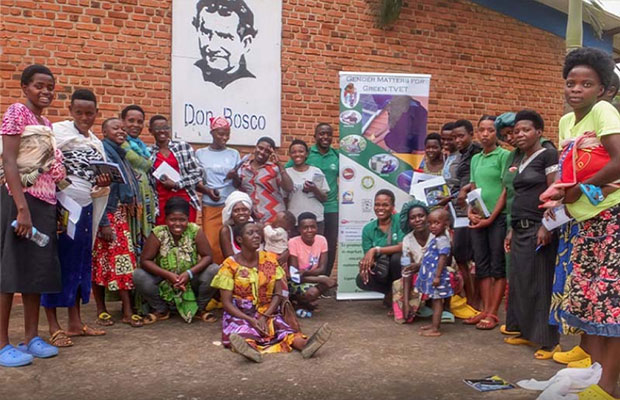
Building a Bridge to Better Futures
“For the first time, I feel sure of what I can do.” These words, from a young lady in Rwanda named Florence may seem at odds with her country’s reputation for supporting gender equality and female empowerment, but the lingering effects of deeply rooted cultural norms still affect public policies and the economy.
“In day-to-day terms, these norms mean that girls and women are still excluded from education and employment opportunities deemed appropriate only for men,” explains Father Michael Conway, director of Salesian Missions. “While less common in more urban and affluent areas, these biases exist throughout the country—with communities that are already impoverished and marginalized feeling the effects most.”
At the Don Bosco School of Technical and Vocational Education in Muhazi, a new Salesian-led project is helping rural mothers like Florence bridge these persistent gender divides and create better futures for themselves and their families.
Unsurprisingly, this bridge is built on the foundation of education—specifically, a six-month agricultural training course where participants develop fundamental farming skills. They also learn how to produce tofu, make soap, and create handbags to sell at a market. This is an important hands-on experience that will help the women find employment or set up their own business ventures.
In addition to Florence, 20 other young single mothers were enrolled in the program’s inaugural session. Their training included professional mentoring and entrepreneurial coaching to further boost their confidence and skills. The women also had opportunities to apply what they learned during practical internships hosted by local business partners.
“I want to thank all our benefactors, because with their help, I have been able to acquire skills. Now I am ready to put into practice what I have learned, wherever it is in Rwanda,” says Rachel, who recently graduated with Florence. “Thanks to the pay I will receive, I will be able to support my child, and my brothers and sisters who depend on me.”
Florence adds, “I used to ask people to rent me their fields, but I always ended up giving up because of my lack of skills. Now I am very happy with this experience, because for the first time I feel sure of what I can do, thanks to what I have learned.”
A new group of young women from vulnerable situations have begun their own training in the project—with Florence, Rachel and their entire class cheering them along.
Learn more about our work in Rwanda.
Our mission empowers vulnerable young mothers with the education they need to pull themselves and their children out of poverty. What’s your mission?

